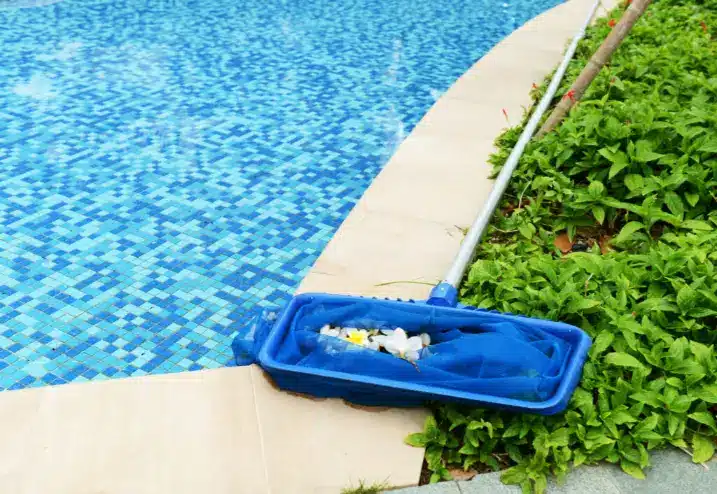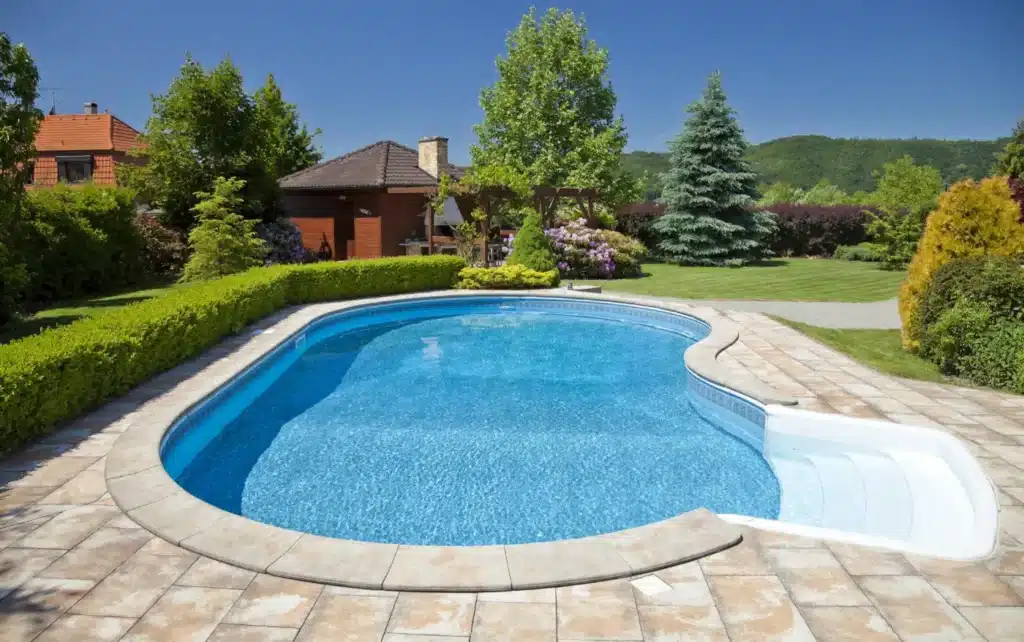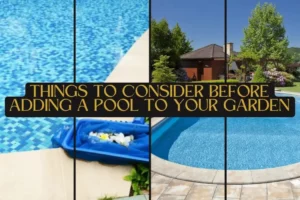If you’ve been dreaming of adding a pool to your outdoor space, now may be the time. With the summer days growing longer and warmer — what better way to cool off than with your private oasis? But before jumping in feet first, there are some important things to consider regarding design, cost, safety, location, and more.
To set expectations for this fun project, we’ve broken down seven of the most important questions you should ask yourself before installing a pool in your backyard. Read on and get ready to dive into the deep end!
Investigate the cost of maintenance and pool cleaning

Pool maintenance and cleaning keep your pool in good shape and ensure your safety. Before even investing in a pool, factor in the cost of regular cleaning, which includes skimming off leaves and debris, brushing the sides of the pool, and vacuuming the pool bottom. You’ll also need to check the water chemistry weekly to maintain the right pH levels and prevent the growth of harmful bacteria.
The cost of chemicals for treating the water, such as chlorine or bromine, can add up over the years. If you don’t want to take care of the pool yourself, you might want to consider hiring a pool cleaner — an addition to the overall cost of ownership. Additional maintenance costs may include repairing or replacing pool equipment, resurfacing the pool, or dealing with unexpected issues like leaks. All of these expenses can significantly add to the total cost of owning a pool, so you need to list them upfront to avoid any surprises down the line.
Consider the cost of pool installation
The actual cost of pool installation varies greatly depending on factors such as the type, size, and location of the pool. In-ground pools are generally more expensive than above-ground ones but they also tend to add more value to your home. You’ll need to consider the cost of excavation, pool materials (vinyl, fiberglass, or concrete), installation labor, and any additional features you want, like a deck, lighting, or a heating system.
If your yard isn’t level, additional landscaping or retaining wall may be needed, further adding to the cost. It’s always a good idea to get quotes from at least three reputable pool installation companies and compare prices before taking the plunge.
Be aware of local regulations and safety codes
If you’re thinking about adding a pool to your garden, you must first educate yourself on the local regulations and safety codes that need to be followed. This includes obtaining the proper permits, adhering to zoning laws, and making sure your pool meets safety requirements.
Ignoring these rules and codes may result in hefty fines or even force you to remove the pool entirely. When you’re aware of these guidelines upfront and ensure that your pool is installed and maintained in compliance with them, you can enjoy your new backyard oasis with your mind at ease.
Select the best location for your pool

The perfect pool location can transform your backyard into a luxurious oasis. Besides aesthetic appeal, you should also consider the practical aspects of pool placement. First and foremost, your pool should be installed away from any underground utilities or septic tanks. Also, take into account factors such as wind patterns, sun exposure, and drainage.
In addition to these technical considerations, think about how the pool will fit in with your outdoor living space. You’ll want to choose a location that allows for easy access and comfortable seating areas around the pool. Keep in mind privacy concerns as well, especially if you have close neighbors.
Research different types of pools available
Swimming pools are a refreshing way to beat the heat and enjoy the outdoors. However, there is no one-size-fits-all solution. Before committing to a particular type of pool, research and explore your options carefully. Some common types include:
- In-ground pools: These come in various shapes and sizes, offering a sleek and elegant look. However, they are more expensive to install and maintain.
- Above-ground pools: These are generally cheaper but have less visual appeal than in-ground pools. They are also easier to remove or take with you if you move homes.
- Infinity pools: These create the illusion of water that disappears into the horizon. They are a popular choice for homes with stunning views.
- Natural pools: These use plants and natural filtration systems instead of chemicals, making them eco-friendly options.
- Plunge pools: These small, deep pools are designed for relaxation and cooling off rather than swimming laps.
- Lap pools: These long, narrow pools are perfect for swimmers who want to exercise and keep fit.
Whatever your needs and budget, there is a pool out there that will suit your lifestyle and enhance your outdoor living space.
Shop around for quality materials and equipment
Investing in quality materials and equipment for your pool may cost more upfront, but it will save you money in the long run. Durable materials like concrete or fiberglass are less likely to require frequent repairs or replacement compared to cheaper alternatives like vinyl.
When considering pool equipment, don’t just go for the cheapest option. Invest in energy-efficient pumps, filters, and heaters that may cost more upfront but will save you money on energy bills in the long run. Carefully research and choose a reputable supplier or contractor for your pool materials and equipment.
Make sure that your property is adequately insured
Adding a pool to your property will likely increase the overall value of your home. However, you want to make sure that you have adequate insurance coverage for this valuable addition. Check with your homeowner’s insurance provider to see if they offer additional coverage options specifically for pools. If not, you may want to consider purchasing an umbrella policy or increasing your liability coverage to protect against potential accidents or injuries related to your pool.
Conclusion
Adding a pool to your garden can be an exciting and rewarding project. By carefully considering these 7 factors before taking the plunge, you can ensure that the end result is a safe, enjoyable, and cost-effective addition to your outdoor space. With proper maintenance and care, you’ll be able to make lasting memories in your own private oasis for years to come. Happy swimming!
